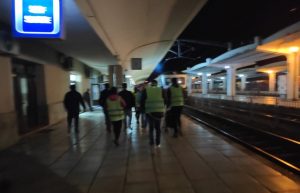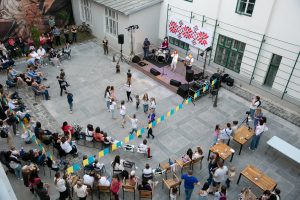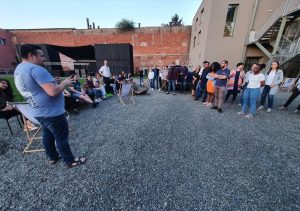Empathy, solidarity and action: How community foundations are responding to the war in Ukraine
10 Jun 2022
Since 24th February, Russia’s invasion of Ukraine has had devastating human impacts, including the displacement of millions of people both within Ukraine and to other countries. In the early weeks of the crisis, GFCF staff reached out to long-term community foundation partners in Bulgaria, Hungary, Poland, Romania, Slovakia and Ukraine to see what we could offer in terms of support: these included several organizations with whom the GFCF has partnered around previous crises, including the 2016 refugee crisis and, more recently, COVID-19. To date, we have made 17 grants to partners, and a recent grant of US $300,000 from Choose Love has enabled us to expand our grantmaking in Ukraine itself, which is ongoing.
Here we share some key highlights and insights on what we are hearing and learning from the people and organizations we are working with. This will be the first in a series of occasional articles about community philanthropy’s response to the war, as the situation in Ukraine and surrounding countries evolves.
In the first few days and weeks, as people fled from towns and cities under attack to other parts of the country and across borders to neighbouring countries, local civil society was quick to mobilize to respond to a situation unprecedented in scale. For community foundations, this included participating in broader collective community-wide efforts to organize immediate aid (transportation, clothing, food, accommodation, translation services etc.) for new arrivals and those in transit and, in many cases, foundation personnel offering rooms in their homes (in Poland, FemFund repurposed its office to be able to accommodate refugees).
A few days into the crisis, Romanian community foundations had already set up their own emergency funds to which local businesses and individuals could contribute. This approach built on their experience of the COVID-19 pandemic: at its peak, community foundations had played a critical role in mobilizing local fundraising efforts. In a context where the public recognized the need to support Romania’s fragile health system but did not trust the government to manage public donations accountably or effectively, community foundations had filled a critical gap. Iași Community Foundation (which is close to the border with Moldova) raised €100,000 (US $107,000) from local businesses and individuals in ten days.
Meanwhile, the Bucharest Community Foundation was quick to set up the Razom Fund (“Together” in Ukrainian). During COVID-19, the foundation raised €175,000 and disbursed it in the form of small grants over the course of seven weeks, and plans were already in place to create a more permanent emergency fund that could respond to sudden crises or disasters. To learn more, foundation staff had recently consulted with women’s funds in Mexico (Fondo Semillas) and Nepal (Tewa) as well as with the Haiti Community Foundation about their post-earthquake disaster response work. Although community foundations in Romania have made great strides in building public trust and promoting local cultures of giving, the Bucharest Community Foundation – like others in the region – does not deduct administrative costs from local donations, opting to shoulder that burden itself or, where possible, from other sources. In the context of the Ukraine crisis, this stands in stark contrast with UK INGOs fundraising for Ukraine, for example, where 7% of public donations are deducted by the Disasters Emergency Committee and where members can use a further 7% for management costs.
In addition to organizing local giving campaigns, community foundations have also been playing to their other strengths during this time of crisis. One of these has been the use of small grants as a way to get money to other local actors who can provide different and more specialized forms of support. By the middle of March, Slovakia had received almost 200,000 refugees from Ukraine. The Carpathian Foundation, which is based in Košice (around 100 kilometres from the border with Ukraine) was quick to organize a programme of small grants aimed at assisting refugees, particularly women, children, Roma and non-Ukrainian nationals. In Ukraine itself, the Ridnya Community Foundation, which is in the west of the country, will also soon be rolling out a series of small grants aimed at supporting internally displaced people and host communities. Another role that community foundations have been playing is that of bridging relationships between local authorities and NGOs, as well as coordinating among NGOs themselves (in the words of one, “so that we waste less and less time as a sector, due to lack of collaboration and communication”).
Twin city relationships have also been important channels of solidarity. The Healthy City Community Foundation in Banská Bystrica, Slovakia, for example – in addition to welcoming refugees to its community – sent supplies some 1,400 kilometres away to its sister community foundation in Sumy, Ukraine. While facilitating the local response to refugees, the Timișoara Community Foundation in western Romania also organized goods to send to its twin city of Chernivtsi, about 950 kilometres away and just across the border into Ukraine.
Compassion, community cohesion and social justice are words that surface consistently across grant documents and email correspondence with partners. For the Stara Zagora Community Foundation in Bulgaria, its response to the current crisis has been shaped by the decision it made back in 2017 to take on a GFCF grant to address the then highly sensitive (and nationally unpopular) issue of refugees, and to bring the community along with them. Although relatively fewer refugees have entered Bulgaria, which does not have a border with Ukraine, 100,000 have remained and the burden for caring for them has largely landed on civil society. This time round, the foundation is explicit in its sense of purpose: “We would like to create a community that responds equally to refugees no matter their country of origin and ethnicity…and to shift mind-sets in the local community when it comes to refugees.”
Even in this protracted time of crisis, partners are already starting to look ahead to the future. In the early days of the crisis, several partners acknowledged the enormous outpouring of generosity and solidarity within their communities, while also expressing concerns about host community “fatigue” potentially setting in at some point, and that this would require a long-term as well as an immediate response. And of course, for those displaced from their homes and jobs, the reality of the situation has started to take its toll. In a recent email, a staff member at the Făgăraș County Community Foundation shared that the longer-term impacts of the war are starting to hit home for the hundred or so refugees that have stayed on in the community: “After three months of being away from home, many are experiencing depression and severe anxiety. We are trying to find the resources for a Community Hub and Makerspace that these Ukrainian refugees can use for many purposes.” Meanwhile, Bucharest has seen refugees leave for Western Europe and then return, the resources they had starting to deplete. Already the shift from immediate relief to longer-term development work and integration is starting to happen, the community foundation remarking that, “We are seeing Ukrainians starting to organize, not just to survive, but in the coming months we expect to see the incipient signs of integration.”
Also living in the moment but looking ahead is the Odesa-based Moloda Gromada. While also involved in distributing food, water and medical supplies to communities, the organization is continuing to build on what has been a long-term programme of work aimed introducing participatory decision-making practices in Ukraine. In the coming months, on four-month cycles, Moloda Gromada will be piloting the Citizen Token System in two communities. The Citizen Token System aims to multiply local responses to the war, by adding value to the small grants Moloda Gromada will be making to support this response. If the pilot phase is a success, Moloda Gromada believes this could be an innovative approach to building community engagement and support in low and middle income communities across Ukraine, as well as in other parts of the world.
****
From our interaction with partners in the region, we have been able to piece together a story of multiple local and national level responses – individual and organizational – to the crisis in Ukraine, led and organized by people with little previous experience of a crisis on such a scale, or experience of the specific challenges faced by women, girls and other vulnerable or excluded groups in such a crisis.[1] “It was a steep learning curve”, shared one partner, another remarking that “As a community foundation, we had no idea what the next steps should be, but we had only one thing in mind at that time – finding a way to show our solidarity!” Local money, volunteers, local organizations and informal groups have formed the backbone of much of this work, with some institutional support from funders with an existing grantmaking footprint in the region. In Romania, Oxfam is partnering with the Community Foundation Network, but otherwise, there appears to be little evidence of, for example, any of the £300 million raised by the Disasters Emergency Committee in the UK reaching local actors – local actors who are on the frontlines, despite the loud commitments made by international actors to localize aid and get more money into the hands of people in need.
Read more about the response of Ukrainian community foundations to the war in a recent article by Darya Ribalchenko, from the National Network of Local Philanthropy Development in Ukraine.
See also Crisis in Ukraine: How one Romanian community foundation has responded, which details the chaos and uncertainty that ensued as the conflict broke out and how the Făgăraș County Community Foundation responded.
[1] See the recent report from VOICE, Waiting for the Sky to Close, which speaks to the specific impacts of Russia’s invasion of Ukraine on women and girls.






